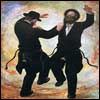Surprise! The Norwegian Nobel Committee has awarded the 2009 Nobel Peace Prize to President Obama. Everyone was surprised, including Obama. After all, Obama had been in office less than two weeks at the time of the February 1st Nobel nomination deadline. That is not much of a chance to do anything, prize-worthy or not. The Nobel Committee explained that Obama was chosen for having "created a new climate in international politics." In effect, Obama was awarded the prize for his intentions, for announcing that he would do things differently.
Would Alfred Nobel approve of this hope-ridden method of choosing prize winners? This question – along with the question whether Obama's policies are indeed conducive for global peace – is the subject of considerable controversy.
But this all got me thinking. Does Judaism, a results-oriented way of life, allow for celebrating good intentions? The answer was not long in coming...
Just one day after Obama woke up to the news that he was a Peace Prize recipient, we observed Simchat Torah. On Simchat Torah, we celebrate two things: we celebrate that we have completed the annual cycle of the Torah reading, but we also celebrate that we are about to begin another cycle—and that it will be on an entirely different and higher level than last year's. It is not only our past accomplishments, safely locked as they are in the unchangeable past, that we can take joy from. We also fearlessly rejoice over the new path we intend to take in the future.
Foolhardy? Jumping the gun? From whence our seemingly premature confidence? Well, our Sages tell us that G‑d has confidence in our intentions too.
There's a biblical mitzvah to fast and pray when we are, G‑d forbid, in a time of peril. For example, in ancient Israel they would institute public fasts in the event of a drought. What, however, was to be done if the nature of the perilous situation precluded the possibility of fasting? Say if an enemy was poised to attack, and fasting would weaken the strength of the city's defenders? The Talmud says that in such an event, the people would pledge to fast and pray at a later date, and their intention to do so would be sufficient to evoke G‑d's mercy.
In a similar vein, the Rebbe would often quote the saying that "charity hastens the redemption." Invoking the Talmudic ruling regarding fasting, the Rebbe said on many an occasion that we need not wait to actually give the charity in order for G‑d to bring the redemption—for as soon as we resolve to do so, we are already worthy of the reward.
Okay, we already celebrated the new path we resolved to embark upon. We got the prize. Now it's time to justify the celebration, justify our confidence, justify G‑d's confidence.





